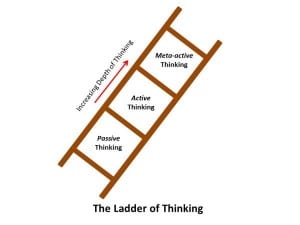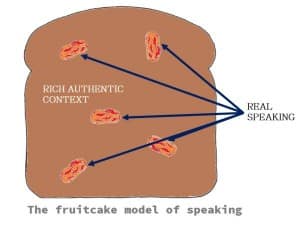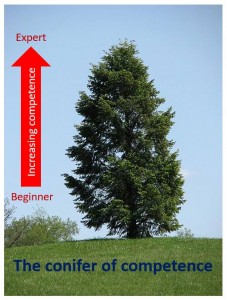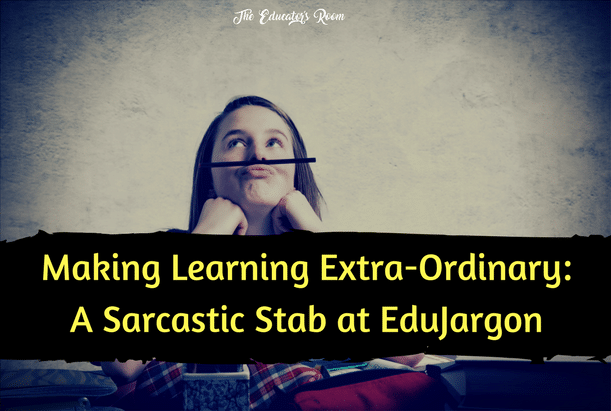During my first week as president of our local association, I shared a copy of a “Faculty Meeting Bingo” manipulative with all our members as a joke regarding educators’ over-reliance on edu-jargon. Eventually, this information made it to our superintendent, who wasn’t too pleased with the actions of his new opposite. Yet I utilized the wait time to make it a teachable moment for our Chief Education Officer: exactly what is our mission here in education?
See, when I began teaching at our district, the administrators had just dove head-first into the constructivist fruit punch that was Learning-Focused Schools. Though I was spritely 24-years-old, I synthesized what Dr. Max Thompson (founder, creator, millionaire) touted and realized I had prior knowledge of pretty much everything he was promoting. Indeed, I inductively self-thought… “this… isn’t… rocket… science.”
It’s teaching.
We’ve got to recall – the early teachers we admire with the greatest locus of learning – Plato, Socrates, and Aristotle – taught while standing on a darn rock and explaining things in an open forum to those holding slate tablets. The only buzz words elicited were spoken by the passing insects.
Enter fictional blogger Tait Smoogen, of “West Bay University,” whose semi-regular sarcastic posts will either evoke laughter or head-scratchers. Why, you might ask? Let’s allow Mr. Smoogen to share his own perspective:
“I decided to start this blog – a stream of consciousness about the process of nurturing, encouraging and releasing the natural talents of the world’s learners. I decided to start this blog so that others may learn from me and set out on their own journey towards Extraordinary Learning. May I be your guide!”
Do these words (and does this tone) sound familiar, teachers?
It’s an easy bet to believe each of us educators has met a Tait Smoogen at some point in our careers.
Some of my favorite posts from Smoogen (who is really Greg Ashman, an Australian teacher and author), include the following (and with fully color, trademarked graphics to boot!)
 Meta-Active Thinking: this third principle (trademark) of the Extraordinary Learning Foundation is one in which students promote themselves beyond thinking so far that they need to Google where France is, and students end by applauding their own efforts.
Meta-Active Thinking: this third principle (trademark) of the Extraordinary Learning Foundation is one in which students promote themselves beyond thinking so far that they need to Google where France is, and students end by applauding their own efforts.- Sp
 eaking for Meaning – “for speaking to have meaning, it must be situated in real, authentic, appropriate contexts: contexts that are familiar to the child. Speaking about democracy and freedom at this stage (2nd grade) is too abstract.” Complete with the fruitcake model of speaking.
eaking for Meaning – “for speaking to have meaning, it must be situated in real, authentic, appropriate contexts: contexts that are familiar to the child. Speaking about democracy and freedom at this stage (2nd grade) is too abstract.” Complete with the fruitcake model of speaking. - Actionizing Thinkiness – “This powerful thinking tool can be used for making any kind of decision, from whether to have scrambled eggs for breakfast to whether to invade Iraq… Knowledge is important. It is crucial. But in the future, our students will have computers and the internet to know stuff for them.”

- The Skill of Competence – “Our key finding is that questions [of competence] can be asked at any time whilst studying any topic. No longer do we have to restrict ourselves to ‘covering’ content. Thus, focusing on the skill of competence is a perfect partner to student-led project work. It really does not matter what they are doing because they can still work on this skill. This is liberating.” How high do you measure if assessed by the conifer of competence?
Mark Twain, the most famed satirist in history, turned to sarcasm to point to the ridiculousness of his age because most of his peers were so blinded by their ignorance. One example of this is the “Advice to Youth” speech he composed, whereby he cautioned children to:
- Obey your parents, but only when they’re around.
- Which reminds me, you should sucker punch strangers.
- Go to bed early and wake up early, but only if you can train a lark to do so for you. So don’t.
- Be careful about lying. But begin the “feeble practice” now.
- Never handle firearms carelessly. Imagine if Napoleon had a bunch of boys with unloaded firearms at Waterloo.
- There are many “good books,” but they are all boring.
And by golly, there’s even a lesson plan on teaching Twain’s assertions on sarcasm in this story, complete with lesson objectives, activating prior learning, hooks, teaching strategy which includes guided questions, an exit ticket, summative and formative assessments, accommodations, modifications, and extensions for your GIEP learners!!
YES!!!!!!!
With lessons like these, I’m definitely going to win the next time we play faculty meeting bingo. (Revised by Education Jargon Generator):
By unpacking core centers in this initiative, we will integrate school-based, authentic solutions with a laser-like focus at our shared pedagogical enhancement’s…
Bingo.





